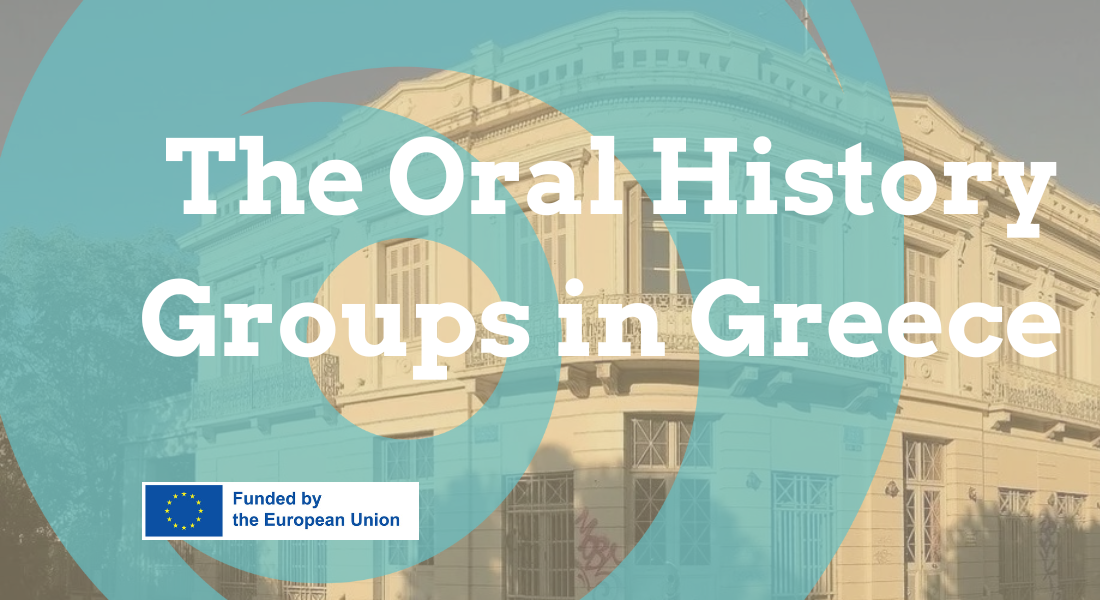
04/11/2024
We invite you to discover inspiring practices of GLAMs operating as commons. Each case exemplifies the significance of community engagement, volunteerism, and the preservation of cultural and historical resources. They share a commitment to creating and sustaining accessible spaces for knowledge-sharing and cultural enrichment, often adapting to evolving circumstances and community needs.
We want to learn from your experiences.
Overcoming financial constraints, addressing community engagement issues, or finding innovative ways to ensure sustainability, what are your success stories? How these obstacles can be surmounted? We invite you to share valuable insights and best practices, and to offer practical guidance for those looking to embark on similar initiatives.
Case #1: The Oral History Groups in Greece by Mina Dragouni and Dimitris Pettas
The Oral History Group (OHG) constitutes a unique case of bottom-up, self-organised initiatives’ network around the creation and dissemination of oral history archives.
The first Oral History Group was created in 2011, followed by five more in 2013 and 2014, in the midst of the multileveled crisis in Greece, aspiring to provide self-organised, grassroots groups of non-professional historians, yet highly educated, with essential methods, skills and tools in order to collect oral testimonies, mainly from everyday people, and create relevant archives. The Oral History Group network positions itself in the landscape of the large-scale mobilisations that emerged in the aftermath of the 2008 economic crisis, as expressed nationally – through the “squares’ movement”, as well as internationally, through the “Occupy” and the “Arab spring” movements. While the first groups developed in central Athens, during the following years, relevant groups also operated in smaller cities and islands around Greece. The OHG network is now (2023) comprising approximately 19 distinct groups, three of which developed around specific themes (e.g., the feminist OHG), while the remaining 16 have a specific geographical focus, extending from neighbourhoods to cities and islands.
The OHGs unique attributes which are contributing to their commons-oriented character lie in :
-their overall horizontal governance and management concerning each distinct group, as well as the “umbrella”, coordinating body, which operate and take decisions through assemblies that take place every three months,
-the inclusive and horizontal content creation, as the groups collectively decide on the content of the archives and design/ implement the data-collection process,
-the ties and relations of mutual support between OHGs’ members with actors and networks, extending from social movements and residents’ associations to local authorities and academic institutions,
-the clearly stated claim on behalf of the OHGs to operate as progressive political actors and
-their cooperative and open organisational structure.
The total of the OHGs, as well as the coordinating body are informal, meaning that they do not have a legal status/ form and ownership. Alongside that, there is no official membership status for participants. Nevertheless, OHGs are created, operate and design/ implement their activities under specific rules which are collectively decided upon. Moreover, there is a common methodology employed concerning the collection of oral testimonies, as well as the creation and maintenance of historical archives. As for the structure, there is no fixed organisation chart that includes sub-groups or a specific allocation of roles and duties. On the contrary, all members participate in the total of necessary tasks, varying on the time each one can devote to the group.
OHGs have limited operational expenses, which mainly concern the necessary equipment for creating and maintaining the archives (recorders, hard drives etc.). Members burden with these expenses themselves, while the volunteer engagement and provision of labour on behalf of the members significantly contributes to the financial sustainability of the groups. Moreover, they also rely on external actors, mostly for the provision of spaces and venues for the organisation of events. This mode of financing plays a key role in providing the groups with independence and autonomy but, on the downside, the lack of legal status prevents OHGs from applying for external funding through the acquisition of grants, participation in research projects, public funding etc.
The OHGs are motivated by and have clearly stated political and societal values, including the development of alternative narratives about history which could be employed in attempts to confront ongoing social, political and economic challenges, the juxtaposing of collective memory to the “faceless markets and oblivion”, the promoting of alternative modes of bottom-up (self)organisation and collectivity, the co-production of archives building upon cooperative principles. As we find in their website: “oral testimonies have a particular weight in a society in which painful memories are “hidden from history”, such as the Greek civil war trauma. People’s suffering because of the crisis has incited demands for a truth that is more “truthful” than history, the truth of personal experience and individual memory. And, last but not least, there is a remarkable analogy with the “acceleration” and the “democratization” of history. That’s why, in this time of crisis, oral history has become a “people’s project””.
OHGs build upon extended networks towards both gaining support and disseminating their operational model and archives. These networks include educational institutions (from primary schools and high schools to university departments), libraries and archives, social movements, professional and residents’ associations, local authorities etc. Concerning the aforementioned actors, collaboration can undertake various forms, from the provision of spaces and venues to presentations, walk tours and seminars.
Due to the informal character of the OHGs and the lack of a legal status that would enable their ‘official’ involvement in institutional actors’ processes, collaboration is also informal, often building upon the extent of the interpersonal and professional networks of the members.
Funded by the European Union. Views and opinions expressed are, however, those of the author(s) only and do not necessarily reflect those of the European Union or European Research Executive Agency (REA). Neither the European Union nor the European Research Executive Agency (REA) can be held responsible for them.
*To become a GLAMMONS stakeholder is to engage in a wider network characterized by ongoing exchange, structured communication, and mutual benefits, all in accordance with GDPR compliance.